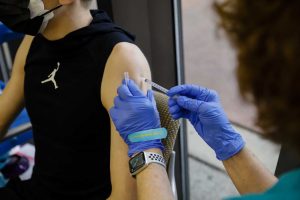More dangerous 'delta' strain now classified 'variant of concern’ in U.S.—here's what that means for you

The delta variant of the coronavirus, which was first detected in India, is now classified as a "variant of concern," according to the Centers for Disease Control and Prevention. Delta, previously known as B1617.2, currently accounts for 10% of new Covid cases in the United States.
Delta is more transmissible and more likely to cause severe illness in unvaccinated people.
Dr. Scott Gottlieb, former Food and Drug Administration commissioner, said delta will likely become the dominant strain in the U.S., and could "spike a new epidemic heading into fall," during an interview with CBS' "Face the Nation" Sunday.
The best way to prevent that is to get vaccinated.
In the U.K., where delta has already become the dominant strain, "transmission is peaking in the younger group of 12- to 20-year-olds — mainly that group that we're concerned about here, about making sure they get vaccinated," Dr. Anthony Fauci said during a White House press briefing June 8. (In May, the FDA authorized Covid vaccination for children ages 12 and up.)
Here's what you need to know about the delta variant:
What is a 'variant of concern' and why does delta qualify
The CDC uses a classification scheme that defines three classes of SARS-CoV-2 variants. The first level is a variant of interest, then a variant of concern and finally a variant of high consequence.
A variant surpasses "interest" and becomes a variant of "concern" when there's evidence of a couple things: an increase in transmissibility, more severe disease, a reduction in the neutralizing antibodies that you get from vaccination or having Covid, reduced effectiveness of treatments or vaccines or when there's a decrease in effectiveness of diagnostic tests for it, according to the CDC.
(So far no variants have been classified as "high consequence" in the U.S.)
The re-classification of delta "is based on mounting evidence that the delta variant spreads more easily and causes more severe cases when compared to other variants, including B.1.1.7 (Alpha)," the CDC said in a statement to NBC News.
Indeed, data from Public Health England (PHE) indicates that delta is 60% more transmissible in households than alpha, which was originally documented in the U.K. And alpha is already more transmissible than the original version of the coronavirus. Early data suggests that there may be an increased risk of hospitalization with delta, according to PHE.
The WHO deemed delta a variant of concern in May. Other variants of concern include alpha; beta, previously known as the South Africa variant; and gamma, identified in Brazil. (The WHO assigns variants a Greek alphabet letter to make it easier to say than the scientific name and to avoid the stigma that may come if the variant is nicknamed after a particular region.)
What this means for you
The good news is that two doses of the currently available Covid vaccines in the U.S. appear to be effective against the delta strain.
A recent study out of the U.K. showed that the Pfizer-BioNTech mRNA vaccine is 88% effective against the delta variant two weeks after the second dose.
However three weeks out after just one dose, the Pfizer vaccine and the AstraZeneca vaccines (the latter of which is approved in the U.K., but not in the U.S.) were only 33% effective against symptomatic disease from delta, which is why it's so important to get both doses.
Other preliminary data showed that the antibodies produced by Pfizer and Moderna's mRNA vaccines were able to neutralize the delta variant. And the Johnson and Johnson single dose vaccine appears to be effective, Gottlieb said on "Face the Nation."
However, experts warn that there could be outbreaks of the delta variant as soon as the summer in parts of the U.S. where vaccination rates are lower.
Dr. Bob Wachter, chair of the Department of Medicine at the University of California, San Francisco, tweeted Monday that vaccinated people should keep an eye on the percentage of delta infections in their community.
"If you're seeing more cases [and] more Delta, I'd restore some precautions (esp. if you're high risk)," he said on Twitter, including wearing a mask indoors.
In the U.S., 52.6% of the population has received at least one dose of the Covid vaccine and 43.9% is fully vaccinated.
Sign up now: Get smarter about your money and career with our weekly newsletter
Don't miss: How Dr. Fauci answers 2,000 emails a day — even though he ‘just can’t’ be an inbox zero person
Source: Read Full Article
